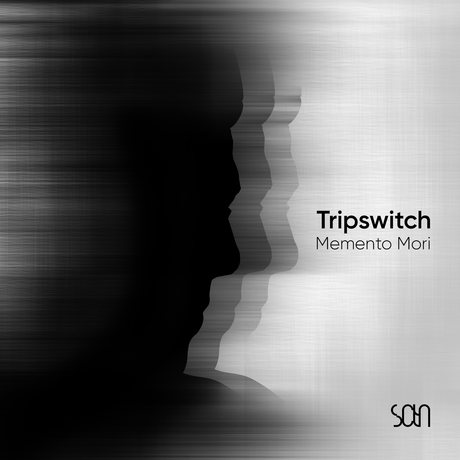In support of the release of his new chillout album Memento Mori – Kiss FM is pleased to present a special “Chill Mix” from Tripswitch.
‘Memento Mori’ is the first Chillout album from Tripswitch in a decade and it’s a creative space that he’s wanted to explore again for a while now. Having been mainly focused on his burgeoning proper Progressive House orientated alter ego and his highly-respected onedotsixtwo label for the past few years, Tripswitch has now found time to step back onto his parallel career path and return to where it all began 20 years ago, creating emotive Chillout and Electronica of the highest order.
“Having been through some life experiences that had left me with some worthwhile stories to tell, I bunkered down in the studio and set to work on what I think is my most personal, thought-provoking and hopefully uplifting work to date.” – Tripswitch
‘Memento Mori’ features 12 tracks firmly positioned within Tripswitch’s uniquely distinctive brand of Downtempo Electronica, including a rather special collaboration ‘Last Waltz In Weirdsville’ with good friend and all-round legend, Nick Warren. The whole album is an aural mind-movie experience, dripping with emotion, as it waltzes between haunting melancholic beauty and lustral euphoric widescreen grooviness, via scary-dark cinematics and evocative downtempo jazzbeat experiments. Heart-melting pianos vie for attention with technological in the box futurism and deep-diving ambience, as the parade gathers toward a heavenly finale. ‘Memento Mori’ is a masterful statement that emphasises exactly why the album format remains such an important vehicle for unbounded artistic expression.
“This new collection is an expression of the last 2 or 3 years or so of my life – the sleeve notes will delve deeper into that journey and message – so there’s some shade, but a fair bit of light too. And the shade can be a nice place to hang out when the sun’s too strong.” – Tripswitch
With the album finished and mastered, Tripswitch felt decidedly invigorated and, with his creative juices flowing freely, has pushed on with some other experimental projects, including creating ‘Big Bad Blue’ – music based on ‘The Outlaw Ocean’, a New York Times Best-Selling book by Ian Urbina, that chronicles lawlessness at sea around the world: https://www.theoutlawoceanmusic.com/artists/tripswitch
Tripswitch’s decades long creative journey began in earnest when his genre-defining ‘Circuit Breaker’ (2005) album debut garnered glowing praise from many major press outlets, including Anoushka Shankar in the NY Times. It’s tracks featuring on numerous high-ranking compilations and led to Tripswitch licensing music for film, TV, adverts, a major video game, and showcasing his inimitable brand of live performance all over the world.
‘Geometry’ (SCTN0001) was the critically acclaimed follow-up album that launched Tripswitch’s first label, Section Records, in 2010. Since then, the delightfully eclectic platform, self-curated with a unique vision to continually push the creative envelope, has steadily joined disparate musical dots to create a coherent catalogue that encompasses Ambient, Dub, Downtempo and Drum & Bass, through to Progressive Electronica, NuDisco and beyond.
‘Memento Mori’ is released digitally on Section Records on all major platforms from 22 April 2020. In addition, Tripswitch launched a successful Kickstarter campaign to offer highly collectible ltd edition physical formats of the album for fans: https://www.kickstarter.com/projects/tripswitch/new-tripswitch-album-memento-mori-cd-and-usb-release
Tripswitch Info:
https://twitter.com/nicktripswitch
https://soundcloud.com/tripswitch
https://www.facebook.com/nicktripswitch
https://www.instagram.com/nicktripswitch
https://www.friskyradio.com/show/harmonics
https://open.spotify.com/artist/2IqtS42vE5AfagYUt1IjL3
Section Records Info:
https://twitter.com/sectionrecords
https://soundcloud.com/sectionrecords
https://www.facebook.com/sectionrecords
https://www.beatport.com/label/section-records/17851

“Memento Mori”. Remember that you will die.
Sounds gloomy, right? Well yes, it does at first sight. There is no more natural an instinct than to fear death, and our inability as children to conceptualise it grows with us to become a blind spot that prevents us from reflecting, meditating or even accepting that we, and everyone, and everything around us, will die.
That universal destination – for our ancestors, ourselves and our progeny – is the one universal truth.
The practice of reflecting on death as a source of inspiration and motivation, crosses ages and cultures, from the ancient Greeks, Romans and Egyptians, to Buddhists and Roman Catholics today. The theme is common throughout: remembering that death comes for everyone – rich and poor, gifted and unexceptional; it can invigorate life, and create priority and meaning. Carpe diem. Valar Morghulis, to quote Game of Thrones.
Contemplation of death was a key tenet of classical Stoic philosophy. As Seneca wrote, “Let us prepare our minds as if we’d come to the very end of life. Let us postpone nothing. Let us balance life’s books each day. … The one who puts the finishing touches on their life each day is never short of time.” The history books tell us that in ancient Rome, the glory bestowed upon victorious generals in a victory parade would be balanced by the presence of a slave in the general’s chariot, constantly reminding him, “Look behind. Remember thou art mortal. Remember you must die!” Thus the practice of Memento Mori served a dual purpose: to help us make the most of our time in this ephemeral existence, and to keep us grounded.
The concept was repackaged and repurposed by the early Christian Church, encouraging a focus on the afterlife as a path to a better and more obedient life, as well as a reminder of the emptiness of earthly achievements and rewards. Catholic dogma returns to this concept in so many elements of the catechism – Ashes to Ashes, Dust to Dust – and a whole classification of Christian art, architecture and music grew up out of this fundamental preoccupation. More recently, the Mexican Day of the Dead celebrations are an overt manifestation of Memento Mori, with their candy skulls and bones, and Calavera poems written in honour of friends, but addressed as if the recipient were dead.
In Eastern cultures we find that the notion of death is widely entrenched across history and beliefs. As Buddha himself put it, “Of all the footprints, that of the elephant is supreme. Similarly, of all mindfulness meditation, that on death is supreme.” Maranasati, or ‘death awareness’, is a highly valued meditative practice using a variety of visualisation and meditation techniques to reflect on the nature of death. In the LoJong of Tibetan Buddhism, Impermanence is one of the Four Thoughts, the basis for dharma practice, and intended to encourage the practical and spiritual urgency, which allows us to reach our potential.
This discipline permeated through Zen Buddhism into Japanese culture. Yamamoto Tsunetomo, in the Hagakure Kikigaki, states, “the Way of the Samurai is, morning after morning, the practice of death, considering whether it will be here or be there, imagining the most sightly way of dying, and putting one’s mind firmly in death.” In Islam too, ‘remembrance of death’ is a recurring topic, with the Hadith teachings imploring believers to “remember often death, the destroyer of pleasures”. Some Sufis are known as ‘the people of the graves’, due to their practice of visiting graveyards to contemplate mortality and the vanity of life. For Hindus, death is seen not as an end, but as a temporary cessation of physical activity for the Jiva or soul, to be repeated until the Path of the Sun is taken and Moksha is achieved. As a stepping-stone to liberation, it is no less of a focus for devotees, and few religions or cultures accept it so universally as a part of life.
Even in today’s secular, social media-driven society, the Instagram generation have found their way to recognising the concept of Memento Mori. #bucketlist and #yolo may be fluffy buzzwords, but they are still underpinned by the recognition that our time here is limited; that one thing we can’t plan is our time of death.
I had my own reasons for arriving at this truth; my journey with this album started with a shock. A health scare late in 2016 stopped me in my tracks and made me fear for my life. I didn’t cope well. Like so many with an artistic temperament, I’m prone to overthinking, and for a few dark months my thoughts spiralled progressively out of control. I obsessed and started planning for the worst.
I was blessed to come out of the other side relatively unscathed physically, but what followed was two years of attempting to rationalise what I’d been through, exploring and reflecting on these concepts, which ultimately led me to a more grounded and focused presence. Part of the healing process was writing the music you hold in your hands. In a sense, every track I’ve written has been a catharsis, but never more so than writing Memento Mori. It’s an expression of the last two years or so… there’s some shade, but I hope a fair bit of light too. And the shade can be a nice place to hang out when the Sun’s too strong.
The ironic timing of this release – in the throes of the 2020 Coronavirus crisis – has not been lost on me. To be releasing an album about accepting and reflecting on your own mortality, at a time when so many people worldwide are being forced to confront their own, seems both perverse and poetic. But I hope that the message is taken in the spirit with which it is intended, indeed in the spirit that Memento Mori has always encouraged throughout the ages. This is an album not about death, but about life, and making the most of it.
I hope, above all, that you enjoy this music, whatever you choose to take from it. It’s been an emotional but fulfilling journey writing it and for me, the music speaks of hope, love and triumph over adversity. However you choose to interpret it, my wish is that it brings pleasure and light in these peculiar times.
Nick Brennan, April 2020





